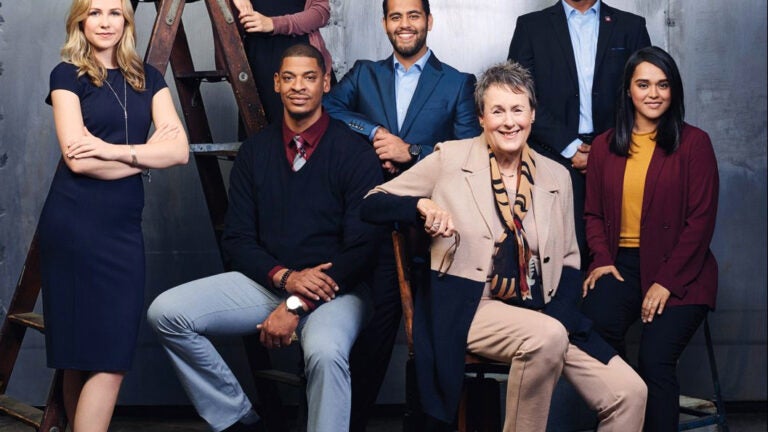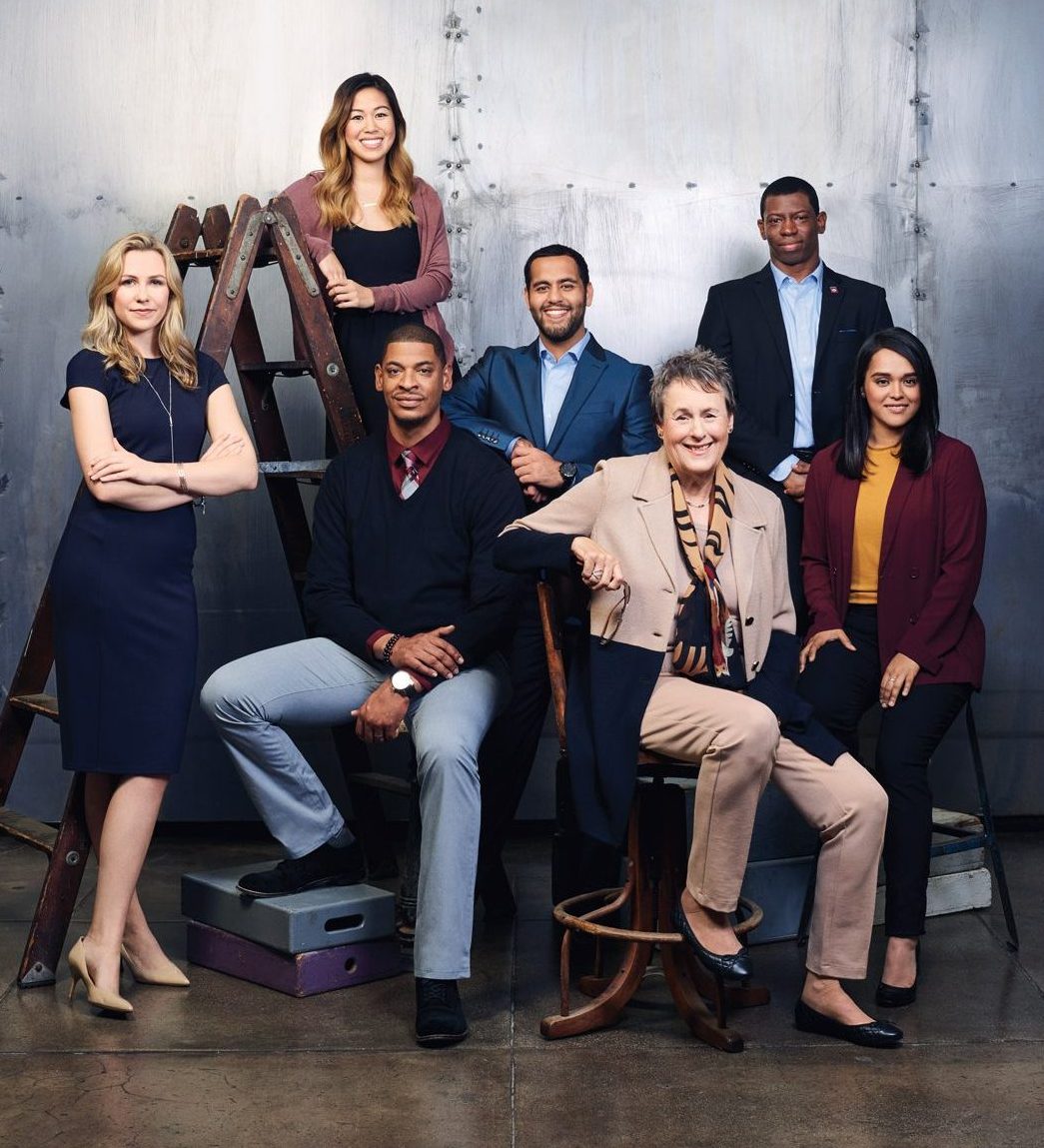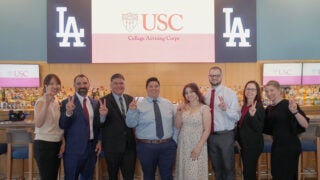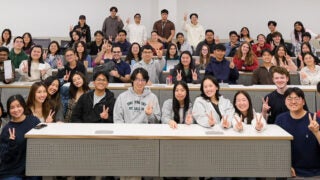
USC Empowers a New Generation of Social Workers
A $60 million school-naming gift gives future social workers strong support.
Suzanne Dworak-Peck ’65, MSW ’67 got a glimpse of her future during her senior year as a psychology major at USC. She was on a tour of Los Angeles County + USC Medical Center when she first saw a professional social worker in action. The woman’s training and ethics shone through as she worked with children and families.
Inspired, Dworak-Peck had found her passion. She made it her mission to make a difference in the world and in the lives of others. Today she’s a dedicated leader in the social work profession.
It wasn’t an obvious path, though. Social work is a field dedicated to helping people overcome some of society’s biggest challenges—such as poverty, homelessness and mental health issues—but at the time, Dworak-Peck says, people weren’t readily encouraged to enter the field as a way to help others, as they were in law or medicine.
Over the years, she realized that most people were simply unaware of the scope and scale of the social work profession. Maybe it was because social workers often work in the background, helping others to succeed. Or maybe it was because social workers didn’t often hold prominent positions of power or influence in national dialogues about societal problems. Even in the fictional world of television dramas, social workers are often relegated to minor or negative roles.
Dworak-Peck wanted to change social work’s image and educate people about the profound impact of the profession on society. “If we as social workers are going to empower others,” she says, “we must first empower ourselves.”
Last fall, she did just that by donating a historic $60 million to endow and name the USC Suzanne Dworak-Peck School of Social Work. Her gift marked the largest contribution from an individual to a school of its kind. Dworak-Peck’s donation not only cemented the school’s standing as one of the world’s most innovative institutions within the discipline, but also invested deeply in the school’s and the profession’s future.
“My wish is that this endowment will create greater awareness and understanding about the profound impact of the social work profession,” Dworak-Peck says.
Her landmark gift isn’t the first time Dworak- Peck has spotlighted the importance of social workers. In addition to advocating for the profession in the California and U.S. capitols and at the United Nations as president of several social work organizations, she also founded a network to consult with media and entertainment entities to more accurately portray social work in the news and on television shows.
“Suzanne Dworak-Peck is a visionary who has shown extraordinary leadership in her field, almost single-handedly changing how we perceive social workers,” says USC President C. L. Max Nikias. “Her great generosity is matched only by her passion for social justice and her drive to inspire change by reimagining social work so it empowers everyone it touches.”
A CURRICULUM FOR INNOVATION
Dworak-Peck’s gift dramatically boosts the school’s efforts to turn social workers into powerful advocates for wellbeing, says Marilyn L. Flynn, the school’s dean for the past 20 years. Flynn oversees the largest social work school in the world and one of the oldest. “Inspired by Suzanne’s leadership, we will strive to transform the role of the social worker in a way that allows us to influence the work of the public and private sectors to achieve great social good,” she says.
With size and history come authority. The school’s alumni network numbers 15,000, and one of every 20 master’s-level social workers in the nation holds a USC degree. In recent years, the school has revised its curriculum to focus on the emerging science of social work. Students learn “evidence-based practices,” which build on research findings in areas ranging from neuroscience to psychology. These practices aim to help social workers better prevent problems or intervene to solve problems early.
During Flynn’s watch, the school has established several areas of distinction and innovation. Among them: offering high-quality online graduate education, developing a focus on veterans and their families and addressing homelessness.
Inventive online programs are one reason that the school’s overall student enrollment has tripled to 3,200 since 2010. These programs allow students across the country to earn their USC Master of Social Work, Doctor of Social Work or Master of Science in Nursing degrees.
The online program also makes it easier for students in the armed forces who may be deployed abroad to enroll in the school’s military social work specialization. Launched in 2009, the training prepares social workers to address the unique challenges faced by veterans and military families when they return home from service. The program was the first of its kind at a civilian research university, and veterans make up about 20 percent of its graduates.
Those pursuing the military social work specialization can tap into the research conducted by the USC Center for Innovation and Research on Veterans & Military Families (CIR), which is housed at the school. The center’s comprehensive studies have identified crucial gaps in support for housing, career development and mental health services, which put many returning veterans at risk for homelessness and long-term unemployment.
“If you want to know about current research studies on veterans, academics know to contact CIR and USC,” says Kimberly Finney, lead professor for the school’s clinical practice course on service members and veterans. “USC has developed a roadmap for how to get veterans reintegrated as productive members of society.”
More than 325,000 veterans call Los Angeles County home, according to the CIR, and USC’s commitment to improving the care and services furnished to them made the university a natural fit for the Steven A. Cohen Military Family Clinic at USC. The clinic, which opened in fall 2016, offers free health care to those who served after the Sept. 11 terrorist attacks and who suffer from post-traumatic stress and other mental health conditions. Unlike the Department of Veterans Affairs, the clinic welcomes those who served in the National Guard and the Reserves, as well as veterans who did not receive an honorable discharge. Their family members are eligible for care, as well.
The school also draws veterans into its classrooms. “Some veterans come out of the military with a drive to serve or be part of something bigger than themselves. They want to become social workers and give back,” says Finney, who joined the school after 23 years as an Air Force clinical psychologist.
Eric Woolridge of Los Angeles is one of them. As a Master of Social Work student on campus, the Army vet worked with classmates on a social media project to raise awareness of sexual assault in the military, which is often unreported and has been linked to an increased likelihood of homelessness and mental disorders. “As social workers, we are agents of change,” he says. He hopes their effort will help reshape military culture and make it safer for victims to report sexual assault. After graduation this year, he plans to start his own business helping veterans transition to civilian life.
REAL PROBLEMS
Homelessness is a national crisis, but in Los Angeles the problem is especially challenging. Los Angeles County claims the largest homeless population in the nation, with nearly 50,000 people sleeping on sidewalks, in cars or in shelters last year. USC leads the national push, along with New York University, to get social work schools to prioritize homelessness. Benjamin Henwood, assistant professor at the USC Suzanne Dworak-Peck School of Social Work, steers the national Grand Challenge to End Homelessness effort.
Tackling huge problems like homelessness starts with rigorous research to understand the complex underlying issues, says Suzanne Wenzel, the Richard M. and Ann L. Thor Professor in Urban Social Development for the school and one of the nation’s foremost authorities on homelessness. Findings in 2016 from one of Wenzel’s teams in L.A. are disturbing. They showed that nearly half of all women living on the street or in shelters reported being physically or sexually assaulted in the past year, and 90 percent had been assaulted during their lifetime. The groundbreaking study will be used to advocate for additional funding, policy and resources for homeless women.
Students and faculty put their social work passion into practice, too. The Nourished project is an example. It brings together USC students with adults who were once homeless. At a permanent supportive housing facility near Koreatown, students stop by once a week to cook healthy recipes and eat with residents, sharing stories. Volunteers try to change people’s lives in a more substantive way than just handing them a meal, says homeless rights advocate Jack Lahey MSW ’16, co-founder and program manager of Nourished. “For those who have experienced homelessness, building relationships can change their perspective on their community and help them escape the cycle of chronic homelessness,” he says.
BIG DATA FOR GOOD
Social work as a profession began in the early 1900s, when people of goodwill came together to help those less fortunate with shelter, child care, job training and food. While the goal of helping others hasn’t changed, today’s practitioners like Dworak-Peck are quick to point out how their work has become grounded in science and evidence.
Marleen Wong MSW ’71, clinical professor and senior associate dean of field instruction, helped conduct a series of groundbreaking studies on the prevalence and impact of trauma in Los Angeles schools in the mid-2000s. Researchers found that 90 percent of children living in certain zip codes in L.A. had been exposed to violence in the previous year—witnessing people who have been kicked, punched or threatened with a gun or knife, or experiencing such incidents themselves.
“It was shocking to everyone that the children we studied had higher rates of post-traumatic stress disorder than military returning from [war in] the Middle East,” she says.
The studies not only drew attention to the issue, but they also led Wong and her colleagues to develop tools for mental health professionals and teachers to help children exposed to violence and trauma. School administrators worldwide use the program. Wong’s expertise has long been sought at the scenes of tragedies and crises, including the Sept. 11 terrorist attacks, the Oklahoma City bombing and the shootings at Columbine High and Sandy Hook Elementary schools.
The work underscores the contributions that big data can make in helping vulnerable children and families. Jacquelyn McCroskey, who holds the John Milner Professorship in Child Welfare and is co-director of the Children’s Data Network (CDN), knows that unlocking patterns hidden in data can reveal important insights.
The CDN, which launched in 2014, partners with state and county departments of health, public health, education, child welfare and corrections to integrate records from different data systems to inform policy decisions and improve services for society’s most vulnerable children and families.
It is time for us to be more strategic about where we direct our energy and our resources, deriving solutions rather than putting expensive Band-Aids on the problems of the world.
Suzanne Dworak-Peck
The project shows the vast untapped potential in data already collected by public agencies. McCroskey and Emily Putnam-Hornstein, associate professor and CDN’s co-director, have been working on a pilot project with child care and family services agencies in Southern California’s San Fernando, Santa Clarita and Antelope valleys. Their analysis of data from different agencies found that nearly a third of children in subsidized child care were known to child protective services. This information on overlap could improve results for families involved with both kinds of agencies, helping child care providers more effectively support at-risk children and encouraging child welfare workers to consider child care histories and needs of at-risk families.
They’re also partnering with the state Department of Social Services and Los Angeles County to test whether models that predict risk for child abuse can help child protection workers better evaluate a child’s likelihood of mistreatment or neglect.
For Dworak-Peck, incorporating innovative research into social work practice and policy can counter some of society’s greatest challenges. That requires recruiting the best possible professors and investing in the infrastructure needed to teach the next generation.
“As a society, we can’t afford not to invest in social work education,” Dworak-Peck says. “It is time for us to be more strategic about where we direct our energy and our resources, deriving solutions rather than putting expensive Band-Aids on the problems of the world.”
At USC, her transformational gift aims to do just that.




